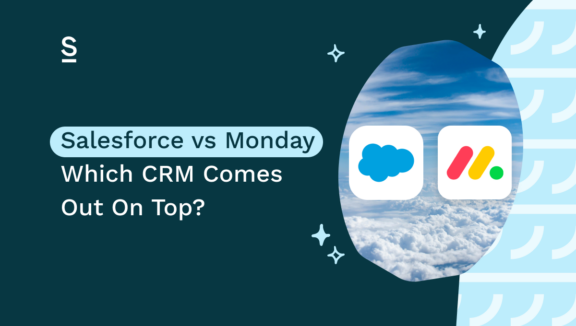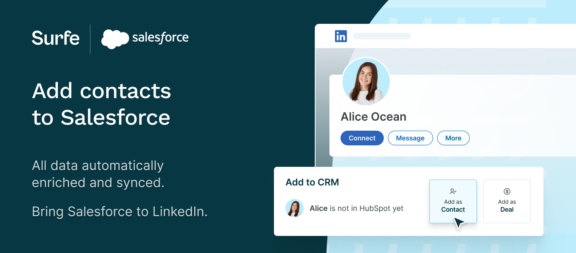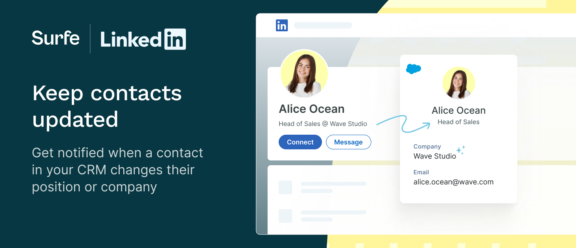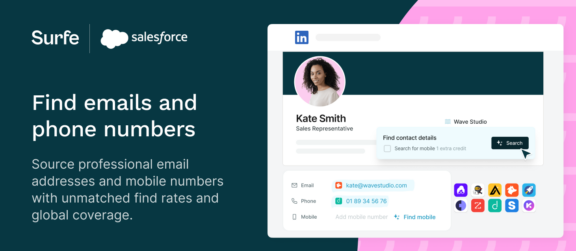Salesforce vs Monday – Which CRM Comes Out On Top?

If you’re reviewing your tech stack to optimize your sales outreach, the chances are you’ll be starting with an audit of your CRM system. But with so many platforms on the market, it can be tricky to differentiate the benefits and drawbacks of all the major players.
Two strong choices for sales teams are Salesforce and Monday, but with so much involved in making a CRM switch, it’s vital that you know just what you’re letting yourself in for when adopting a new product.
We’ve pulled together an unbiased comparison between the two, so you can make the best choice for your team and your business. From cost, to standout features, this guide will give you everything you need to start your CRM switch journey.
Need to skip ahead? We’ll cover:
- Who Is Salesforce Designed For?
- Who Is Monday Designed For?
- Comparing Features: Salesforce vs. Monday
Who Is Salesforce Designed For?
Salesforce is a powerhouse in the CRM world, designed with a broad spectrum of industries in mind. From small businesses to enterprise-level corporations, Salesforce caters to companies that need a robust, scalable CRM solution. Its flexibility and extensive customization options make it a favorite among sales teams, customer service departments, marketing professionals, and IT administrators. Salesforce excels in environments where there is a need for complex data management and deep integrations with other enterprise systems.

Who Is Monday Designed For?
Monday, on the other hand, is an intuitive work operating system that extends beyond traditional CRM functionalities. It’s perfect for businesses looking for a versatile platform that supports project management, team collaboration, and workflow automation alongside CRM features. Monday is particularly popular among startups, creative teams, marketing agencies, and project managers who appreciate its user-friendly interface and customizable dashboards. Its visual approach to task management makes it ideal for teams that thrive on visualizing their workflow and progress.
Comparing Features: Salesforce vs. Monday
What are Salesforce’s Main features?
- Sales Cloud: Sales Cloud is designed to manage sales processes comprehensively. It offers lead management, opportunity tracking, and sales forecasting. Sales teams can use it to create detailed customer profiles, track interactions, and manage their sales pipelines effectively. It also includes tools for managing contacts, accounts, and tasks.
- Service Cloud: Service Cloud provides robust customer service capabilities, including case management, knowledge bases, and support automation. It enables customer service teams to resolve issues faster with AI-powered recommendations and automated workflows. Features like live chat, social media integration, and a self-service portal enhance customer support experiences.
- Marketing Cloud: Marketing Cloud is a powerful suite for managing and automating marketing campaigns. It includes tools for email marketing, social media marketing, advertising, and customer journey management. With Marketing Cloud, businesses can create personalized marketing messages, track campaign performance, and optimize engagement across multiple channels.
- Commerce Cloud: Commerce Cloud supports e-commerce businesses by providing a platform for creating personalized shopping experiences. It offers features for product management, order processing, inventory management, and customer service. Businesses can use it to manage both B2B and B2C commerce activities.
- Analytics Cloud: Analytics Cloud, also known as Tableau CRM, delivers advanced analytics capabilities. It allows businesses to visualize data, create detailed reports, and derive actionable insights. With real-time data and AI-powered analytics, companies can make informed decisions to drive growth.
- AppExchange: Salesforce’s AppExchange is a vast marketplace of third-party salesforce applications and integrations. It offers thousands of apps that extend Salesforce’s capabilities in areas like marketing, sales, finance, and more. Businesses can find solutions tailored to specific needs and industries, enhancing the functionality of their CRM.
- Einstein AI: Salesforce Einstein is an AI-powered assistant integrated throughout the platform. It provides predictive analytics, smart recommendations, and automation to help users make data-driven decisions. For example, Einstein can predict customer behavior, recommend the next best actions, and automate routine tasks.
- Customization and Development: Salesforce offers extensive customization options. Businesses can create custom objects, fields, workflows, and reports to tailor the CRM to their unique processes. The Salesforce Platform (formerly known as Force.com) allows developers to build custom applications using Apex code and Visualforce. Because of this powerful platform, many businesses choose to partner with a Salesforce development company to help them navigate these complexities and build bespoke solutions that perfectly fit their needs.
- Integration Capabilities: Salesforce supports seamless integration with numerous third-party applications (including Surfe!) and internal systems. It provides APIs and tools like MuleSoft for connecting disparate systems and creating a unified data ecosystem.
What are Monday’s main features?
- Customizable Dashboards: With Monday users can create highly customizable dashboards track project progress and can give more accessible insights into data. These boards can be customized with different columns, statuses, and tags to fit specific workflows.
- Automations: Monday has some great automation features that can save users hours of time on repetitive tasks like status updates, task assignments and more.
- Integrations: Built to work with a number of third parties, Monday integrates with external softwares including Slack, Google Drive, Trello, Zoom and Microsoft Teams.
- Project Management: Want to create project plans, monitor deadlines and assess progress? Monday can do that, too.
- Time Tracking: Hack your team’s productivity with in-depth time analysis tools. Monday helps you avoid bottlenecks, over-resourcing and wasted time by giving managers a clear picture of which tasks your team are prioritizing and which are getting left to the wayside.
- CRM Capabilities: With Monday, you can create and manage contact databases, track deals, and monitor sales pipelines. Customizable templates make it easy to set up CRM processes tailored to specific needs.
- Collaboration Tools: If you struggle to unite your team in working together across multiple projects, Monday’s collaboration tools can connect a disjointed team. Users can communicate directly within tasks, share relevant documents, and keep everyone on the same page. The platform also supports mentions and notifications to ensure that no important updates are missed.
- Resource Management: With Monday’s resource management tools, you can take a deep dive into who is working on what, allocate resources based on availability, and balance workloads. This feature helps prevent overloading team members and ensures optimal resource utilization.
- Reporting and Analytics: As with all CRM platforms, Monday is packed with advanced reporting and analytics tools that provide insights into project performance and team productivity. Track key metrics and identify areas for improvement by creating tailor-made reports across your teams.

Salesforce and Monday’s USPs
What Makes Salesforce Unique?
With a huge breadth and depth of functionalities, Salesforce is undeniably one of the most customizable CRMs in the market. Its AppExchange Marketplace is a massive resource pool of third-party applications and integrations that can supercharge how sales teams conduct their outreach. With advanced AI and predictive analytics, Salesforce also has unmatched automation capabilities for those who know how to navigate it.
What Makes Monday Unique?
Monday’s distinctiveness comes from its flexibility and user-centric design. Intuitive use is at the core of Monday’s offering and it has been designed for easy adoption and use for teams of all sizes. Much like Salesforce, customization is also a central aspect to Monday’s CRM system, with highly personalizable dashboards and workflows available to users without the need for in-depth technical knowledge. Monday’s entry price point is also one of the most competitive amongst all CRM offerings, making it a great option for smaller teams not ready to commit to large software outlay.
Price Comparison
In terms of what does CRM software help with, cost is undoubtedly a key factor which will impact your team’s decision when choosing a new CRM platform. With Salesforce’s supercharged selection of integrations and automations, it’s no surprise that it comes out as the more expensive option. But can you get just as much bang for your buck with Monday?
Salesforce Pricing*
- Salesforce Essentials: $25 user/month
- Sales Professional: $75 user/month
- Sales Enterprise: $150 user/month
- Sales Unlimited: $300 per user/month
Monday Pricing*
- Basic: $12/user/month
- Standard: $17/user/month
- Pro: $28/user/month
- Enterprise: Custom pricing
*Prices based on an annual subscription in USD at time of publishing. Please check with the relevant platform websites for the most up-to-date costs for your business needs*

What the Reviews Say
Salesforce Reviews
- G2 Rating: 4.2 out of 5 stars from over 12,000 reviews.
- Pros: Users praise its powerful features, customization options, and robust integrations.
- Cons: Common criticisms include its steep learning curve and higher cost compared to other CRMs.
Monday Reviews
- G2 Rating: 4.7 out of 5 stars from over 4,000 reviews.
- Pros: Highly rated for its ease of use, visual appeal, and versatility in managing various types of workflows.
- Cons: Some users mention limitations in CRM-specific features compared to dedicated CRM platforms like Salesforce.
| Salesforce
|
Monday
|
|
| Main Features | Sales Cloud, Service Cloud, Marketing Cloud, Analytics, AppExchange | Customizable Dashboards, Automations, Integrations, Project Management, CRM Capabilities |
| Pricing | Essentials: $25/user/month
Professional: $75/user/month Enterprise: $150/user/month Unlimited: $300/user/month |
Basic: $12/user/month
Standard: $17/user/month Pro: $18/user/month Enterprise: Custom pricing |
| Average G2 Review Rating | 4.2/5 | 4.7/5 |
| Target Audience | Enterprises, Sales Teams, Marketing Departments, IT Admins | Startups, Creative Teams, Marketing Agencies, Project Managers |
| Key Benefits | Customizability, AI Integration, Extensive Marketplace | User-Friendly Interface, Visual Workflow Management, Versatility |
Let’s Wrap it Up!
Whichever way you decide to go on your next CRM system, both Salesforce and Monday offer a great range of features and flexibility to suit your business’ needs. Of course, at a slightly higher price point, Salesforce does include extra firepower – but the question to ask yourself and your team is if you have the resource and the internal knowledge to use these extra capabilities to their full effect.
Make sure to consult all the necessary departments and stakeholders who will interact with your CRM platform including marketing, finance and central operations to ensure you have the right internal buy-in to align on your organizational priorities. Because migrating CRMs is no small task, and needs to be a collective effort from the entire business to reap rewards.

Want to improve the quality of your leads in your CRM?
Surfe integrates LinkedIn with your CRM system to enrich your contact data and help you find up-to-date email addresses and phone numbers for your prospects.
Frequently Asked Questions (FAQs)
Which CRM is better for small businesses?
Monday is often more suitable for small businesses due to its affordability and ease of use. Salesforce, while more feature-rich, can be overkill for smaller teams.
Can I try Monday and Salesforce for free?
Both Salesforce and Monday offer free trials, allowing you to test their features before committing.
Should larger companies use Salesforce or Monday?
Given the scope for automation and integration across functions, larger, more well-funded organizations tend to opt for Salesforce. But Monday’s versatility might be more appealing to large tech innovators, too.


